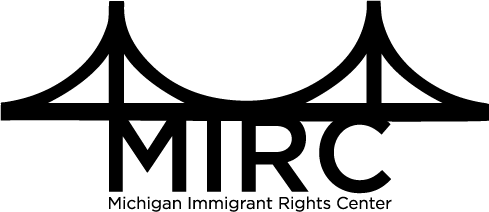Language Access Bills – Senate Bills 382 and 383, House Bills 4720 and 4721
Michigan Immigrant Rights Center
Legislative Alert: Equal Language Access to State Services Act (SB 382 and HB 4721) and Statewide Equal Language Access Coordination Act (SB 383 and HB 4720)
June 8, 2023
Primary Sponsors: Senator Stephanie Chang (SB 382), Representative John Fitzgerald (HB 4721), Senator Mary Cavanagh (SB 383), Representative Ranjeev Puri (HB 4720)
Co-Sponsors: Senator Rosemary Bayer, Senator Erika Geiss, Senator Paul Wojno, Senator John Cherry, Senator Sue Shink, Senator Jeff Irwin, Senator Jeremy Moss, Senator Sylvia A. Santana, Senator Darrin Camilleri, Representative Jaime Churches, Representative Donavan McKinney, Representative Jimmie Wilson Jr., Representative Sharon MacDonell, Representative Kara Hope, Representative Carrie Rheingans, Representative Abraham Aiyash
Bill Status: Introduced June 8, 2023, referred to the Senate Housing and Human Services Committee and the House Government Operations Committee
Bill Summary: These bills would facilitate equal access to state departmental and agency services for individuals with limited English proficiency (LEP) with leadership for this duty placed with the Office of Global Michigan (OGM). The bills require agencies to provide sufficient in-person and other oral interpretation, and the translation of vital documents in areas where LEP populations exceed 3% of the total population or 500 or more people are served by a particular office. Each agency would designate a staff member responsible for reporting to the OGM and responsible for language access within their agency and report every two years to the OGM.
The bills would require the Office of Global Michigan to work with the Department of Civil Rights and create a complaint form and process for members of the public to pursue a remedy for noncompliance with the act. They also preserve the right to complain directly to the Department of Civil Rights about lack of language access. Agency reports would request detailed information about how the agency plans to meet the specific language access needs of its users and collect data to provide services at no cost to users. Agencies would also be tasked with ensuring competency of interpreters and translation services, and increasing public awareness of language services.
MIRC Analysis: These bills, modeled after various other state language access laws and tracking federal language access requirements and guidelines, would help to ensure that equal language access is provided by all state entities providing direct services to the public. They would supplement and complement federal language access laws. The bills would ensure that state agency staff have practical and specific information and guidance about the actions required to ensure language access in a variety of situations.
These bills would also provide much-needed accountability by giving the independent Office of Global Michigan and the Michigan Department of Civil Rights a clearer mandate to address state agencies' failure to comply, a clearer standard to enforce, an enhanced framework for assisting agencies with compliance, and a meaningful complaint process.
We support these bills because of the positive impact it would have on the lives of people with limited English proficiency, most of whom are members of Michigan's immigrant communities. Michigan may not be able to consistently rely on federal enforcement and standards to ensure equity and should take affirmative action. In addition, all Michiganders benefit when people with limited English proficiency are fully included in communication about issues relating to public health, safety, economic development, business and tax compliance, and other common interests the state works to protect.
The Michigan Immigrant Rights Center was pleased to have provided technical assistance in the development of these bills, and similar versions introduced in previous sessions.

